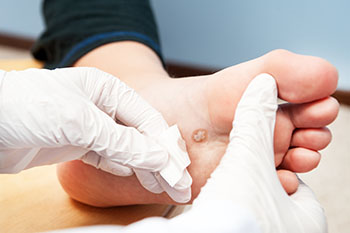Plantar Warts
Hours of Operation
- Monday: 8:30AM – 5:00PM
- Tuesday: 8:30AM – 5:00PM
- Wednesday: 8:30AM – 5:00PM
- Thursday: 8:30AM – 5:00PM
- Friday: 8:30AM – 5:00PM
- Saturday: By Appointment Only
Contact Info
-
Phone: (832) 415-1790

Plantar warts are a surprisingly common foot condition caused by the human papillomavirus (HPV). They often show up on the soles of the feet and, while generally harmless, can be uncomfortable, painful, and a little embarrassing. Whether you’re dealing with plantar warts now or trying to avoid them, it helps to know what causes them, how to recognize them, and the best ways to treat or prevent them.
This guide will walk you through everything you need to know about plantar warts, including symptoms, treatment options, and common questions like, “Can plantar warts spread to others?” and “Are plantar warts painful?” Let’s dive in!
What Are Plantar Warts?
Plantar warts are small, rough growths that develop on the bottom of your feet. Unlike warts that can pop up anywhere on the body, plantar warts form specifically on weight-bearing areas like the heels and balls of your feet. The pressure in these areas often forces the warts to grow inward, creating a callus-like appearance.
What Causes Plantar Warts?
Plantar warts are caused by HPV, a virus that sneaks into your skin through tiny cuts or weak spots. Not everyone exposed to the virus gets warts, but certain factors can increase your risk:
- Walking Barefoot in Public Areas
Communal showers, locker rooms, and swimming pools are prime environments for HPV to thrive. - Weakened Immune System
If your immune system is compromised, you’re more vulnerable to HPV infections. - Direct Contact
Touching a surface contaminated with HPV or coming into contact with someone else’s wart can spread the virus.
Recognizing Plantar Warts: What Do They Look Like?
Spotting plantar warts early is key to managing them effectively. Here are the common signs:
- Small, Rough Growths
These warts often feel grainy or rough underfoot. - Black Dots (Seed Warts)
Tiny black specks inside the wart are actually clotted blood vessels. - Pain or Tenderness
Walking or standing might become uncomfortable if the wart is on a weight-bearing spot. - Thickened Skin
Warts can develop a hard, callus-like layer from the pressure of walking.
If you notice these symptoms, especially on the heels or balls of your feet, you may be dealing with plantar warts.
Are Plantar Warts Contagious?
Yes, plantar warts are highly contagious. HPV spreads easily in warm, damp environments like showers, gyms, and pool decks.
How They Spread:
- Skin-to-Skin Contact
Touching someone else’s wart or your own can spread the virus. - Contaminated Surfaces
Walking barefoot on shared surfaces increases your risk. - Self-Spread (Autoinoculation)
Picking at or scratching a wart can cause it to spread to other areas of your foot or body.
Do Plantar Warts Hurt?
Plantar warts can hurt, especially if they’re on parts of the foot that bear weight. The constant pressure can push the wart deeper into the skin, leading to discomfort and tenderness.
Common complaints include:
- Sharp or Aching Pain
Especially when walking or standing. - Limited Mobility
The discomfort can make standing for long periods difficult.
How to Treat Plantar Warts
Treating plantar warts can range from simple at-home remedies to medical interventions. The best option depends on the severity of the wart and how long it’s been there.
- Over-the-Counter Treatments
- Salicylic Acid: Available as gels, pads, or liquids, this exfoliates the skin to help remove the wart.
- Cryotherapy Kits: These freeze the wart at home.
- Prescription Treatments
- A doctor may use stronger salicylic acid or freezing techniques for stubborn warts.
- Cryotherapy (Freezing)
- In a medical office, liquid nitrogen is applied to freeze and destroy the wart.
- Laser Therapy
- This method targets the blood vessels feeding the wart, causing it to die and fall off over time.
- Minor Surgery
- In persistent cases, a healthcare provider may remove the wart surgically.
- Immunotherapy
- This treatment boosts your immune system to fight the HPV virus directly.
- Home Remedies
- Some people try duct tape, apple cider vinegar, or garlic. While these methods are anecdotal, they might work for minor warts.
How to Prevent Plantar Warts
The best way to avoid plantar warts is to protect your feet and maintain good hygiene:
- Wear Flip-Flops or Shower Shoes
Use them in communal areas like locker rooms or pools. - Keep Feet Clean and Dry
Wash your feet daily and change socks often. - Don’t Share Personal Items
Avoid sharing towels, socks, or shoes. - Boost Your Immune System
A strong immune system can help fend off infections like HPV.
Common Questions About Plantar Warts
Q1: Can plantar warts go away on their own?
Yes, sometimes warts disappear as your immune system fights the virus. However, this can take months or years.
Q2: Are children more likely to get plantar warts?
Yes, kids are more susceptible, especially since they frequent places like pools and locker rooms.
Q3: What happens if I don’t treat a plantar wart?
Untreated warts may grow larger, spread, or become more painful over time.
Q4: Can I remove a wart at home?
Yes, over-the-counter treatments like salicylic acid can help. But persistent or painful warts should be evaluated by a doctor.

